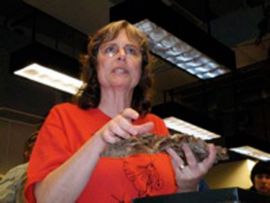Comstock Hall, the building that houses Cornell University’s library of entomology, was uncharacteristically packed Saturday afternoon. More than 3,000 people buzzed through its halls, sampling food and dipping their hands into grimy aquariums. The building reverberated like an excited hive with conversations bouncing and whizzing off its pocked stone. Visitors mingled, and everyone from toddlers to graduate students pressed their noses against thin plates of glass — barely centimeters away from lethal fangs and stingers.

Comstock was the site of Cornell’s fifth annual “Insectapalooza,” a free event open to all ages and designed to foster learning about insects and arachnids. New to the exhibit this year was a room dedicated strictly to butterflies, as well as space on the building’s roof for artistic renderings of beetles. Though Cornell possesses between 6 and 7 million pinned arthropod specimens and thousands of live bugs and spiders, space restrictions allow for only a fraction of that number at each Insectapalooza.
Nevertheless, Linda Rayor, a senior research associate in the university’s department of entomology, said Insectapalooza’s variety of species complements the event’s impressive size.
“We’re comparable to insect zoos all over the country for this one-day event,” she said. “We have an enormous number of spiders here, but it’s more than just the spiders. We’ve got spider relatives here that are spectacular and [that] people never see.”
Rayor teaches classes on insect behavior and spider biology at the university. Her current research centers on the courtship, mother-offspring interactions and other habits of Australian huntsman spiders. Her lab, stacked floor-to-ceiling with enclosures, is home to more than 1,000 huntsmen spiders.
Rayor also developed and directs Cornell’s Naturalist Outreach Speakers Bureau, an organization designed to enhance local appreciation for the environment and increase knowledge about the value of a science education. The bureau was made up of volunteers until three years ago, when it took on the form of a formal course at Cornell. Undergraduate and graduate students in the “Naturalist Outreach Practicum” travel to local classrooms and give presentations related to biology. Since its creation in 1998, the bureau has provided outreach to 36,400 people.
“The idea is to help enhance the science curriculum locally, work with teachers so they can work us into their curriculum,” Rayor said. “I’m training my college students so they can talk about science effectively.”
Jamie Kopco, a sophomore entomology major at Cornell, is currently enrolled in Rayor’s outreach class. He said passing on the knowledge he’s gained about bugs is his favorite part of volunteering at Insectapalooza.
“Answering questions and really getting a lot of people interested in the insects is definitely a lot of fun,” he said.
Saturday, Kopco helped Rayor run Insectapalooza’s live arthropod zoo — a laboratory packed with rare and exotic scorpions, centipedes and other crawlers. Throughout the day, Rayor gave hands-on presentations, frequently handling animals outside of their enclosures to give patrons a close-up glance.
“I had no idea of the extent that they go to to really put on displays — with the live insects, especially,” said Jamie Walters, a graduate student in evolutionary genetics at Cornell who attended his first Insectapalooza on Saturday. “This is a pretty unique event — so extensive and free to the public and just so kid-oriented too.”
Indeed, though Insectapalooza is centered on scientific study, it is also designed to appeal to a diverse audience. Displays ranged from a veterinary entomology exhibit to a cockroach racetrack to a person in a large bee costume posing for photo opportunities, and they were dispersed tightly over three floors. Among those in attendance were students from Ithaca College and Cornell, as well as many from local elementary schools.
Meg Jamieson, an assistant professor of cinema, photography and media arts at Ithaca College, said she enjoyed seeing 19th-century handwritten signs describing insects collected during that period.
“Just thinking about somebody finding [insects] and carefully labeling them and collecting them and the heritage of the study of insects — it’s phenomenal,” she said.
Rayor, who appeared Sunday on the Discovery Channel’s “Nature’s Nastiest” show, said her love of insects developed late. Her early career was spent studying mammals, and it was only after acquiring her first spider that her interest in arachnology was kindled.
“I just went crazy for tarantulas,” she said, laughing and deftly cradling one of Insectapalooza’s roach specimens in her hand.
Rayor said her obsession with eight-legged creatures is not uncommon among first-time spider owners.
“It’s something that happens a lot, I’m afraid,” she said.
Rayor’s Naturalist Outreach Speakers Bureau offers presentations at no charge and will tailor demonstrations to the specific needs and preferences of its audience. It serves students ages 5 to 18 and also designs presentations for adults. Interested parties can e-mail the program at [email protected].




